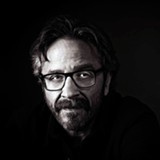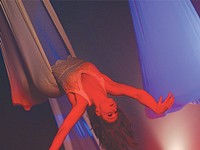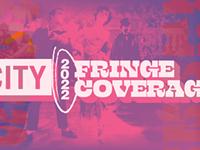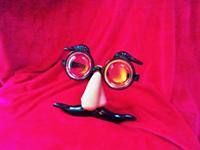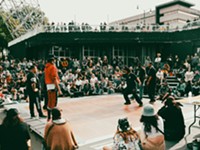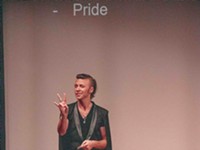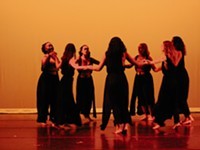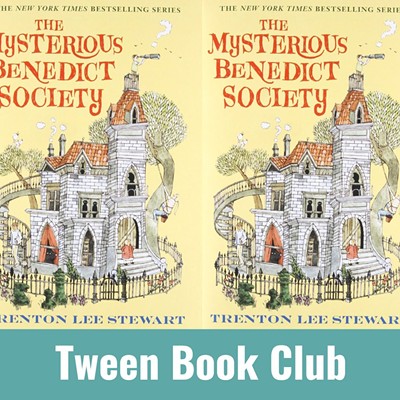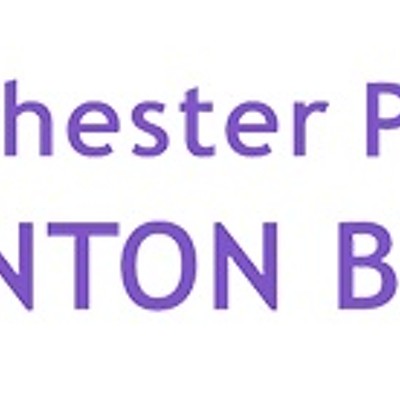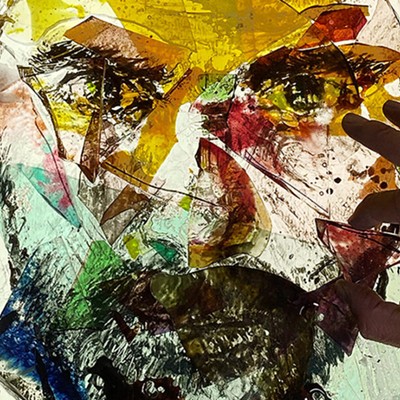[
{
"name": "500x250 Ad",
"insertPoint": "5",
"component": "15667920",
"parentWrapperClass": "",
"requiredCountToDisplay": "1"
}
]
Comedian Marc Maron has sometimes had trouble fitting in over the course of his two-decade career. He's had problems with drugs and alcohol, two failed marriages, and a radio show that got cancelled. But for a Fringe festival, Maron may be the perfect fit.
A few years ago, with no prospects on traditional media and few comedy gigs on his calendar, he started a podcast. All he needed was a Mac computer with GarageBand and a recording studio --- his Los Angeles garage. He called it, appropriately enough, "WTF" ("What The Fuck") and, from the outer margins of the media world, he built it into a successful business.
In the meantime his bookings increased, he landed a sitcom ("Maron," which will return for a second season on the Independent Film Channel next year), and he recently published a memoir, "Attempting Normal."
"WTF" has a simple format: 10 or 15 minutes of Maron's monologue, which could be about a near-death experience or about going to the bathroom, and 45 minutes to an hour of conversation with his featured guest. Over the course of more than 400 podcasts he's interviewed almost every comedian on the face of the earth and a host of filmmakers, actors, writers, and rock stars.
The conversations go deep. Carlos Mencia defends himself against accusations of joke-stealing. Robin Williams explores a bout with alcoholism. Louis C.K. and Maron get into an emotional exchange about their past relationships and C.K.'s failed marriage that brings C.K. to tears.
A biography on Maron's website quotes a fan who told him: "You're like an Iggy Pop Woody Allen." That about nails it. He's cerebral and philosophical but in a raw, primal-scream kind of way. His book and podcast can make you literally laugh out loud or make you wonder about the paths you've chosen in life.
Maron and I crossed paths in the late 1970's when, as a teenager, he attended Lighthouse Art and Music Camp in Pennsylvania. I was teaching art and he was studying guitar with my brother, Steve. He remembers it well.
"That had a profound effect on me the two years I went there," said Maron. "It was a mind-blowing place for kids that were into the art thing. I don't even know if a camp like that could exist now. Jesus, they let us smoke there. It was crazy."
When I reached Maron by phone we talked about how he got into comedy and some of the comedians he admired. But we mostly spoke about the psychological stresses of comedy and why it's so important to him. The following is an edited version of our conversation.
CITY: What was your childhood like?
Marc Maron: My parents were very young when they had me and they were both from New Jersey. What was that old joke I had? They belonged to the first generation of Jews to move as far away from their parents as possible for reasons other than fleeing a country.
Somehow or another we ended up in New Mexico. We were dramatically displaced East Coast Jews growing up in Northern New Mexico. They were both fundamentally selfish people but I think they meant well.
Did any particular comedians inspire you when you were young?
I remember being profoundly affected by stand-ups on television, primarily watching people on "The Merv Griffin Show" or "The Mike Douglas Show" after school. I remember seeing Don Rickles, Buddy Hackett, Jay Leno even, early on. The first season of "Saturday Night Live" was mind blowing to me. I thought that was the best thing in the world. I was 13 or 14 years old.
The first comedy show I went to, I believe, was George Carlin when I was in fourth or fifth grade. That was pretty monumental. And also seeing Richard Pryor's "Live In Concert" movie when I was in high school was a pretty life-changing experience.
You've called Pryor the greatest comedian of them all. Why?
Because he put his heart on the line. You felt like when he was doing comedy he was all in it and there was a lot of emotional risk there.
Some of the most legendary comedians --- Pryor, Lenny Bruce, Freddie Prinze --- had a pretty rough time. What is it about comedy that attracts so many troubled people?
It was pointed out to me that there are plenty of plumbers with drug problems. I think because celebrities are celebrities, the ones that go off the rails draw a lot of attention because people want to connect that trouble to that disposition. But I'm not sure in terms of proportions or percentages that there are not just as many drug addicts and alcoholics in other professions. So I think that struggle is organic to an individual.
I don't know if it's related to the business I'm in, but I think that creative people are overly sensitive and it's a lot to shoulder sometimes. I don't think people do it for relief; there's an alcoholic or drug-addicted disposition.
But comics are there on the stage alone. There's not even a guitar between them and the audience. Do you see that as a vulnerable position or a powerful one?
It's different for everybody. After a certain point the ability to get on stage, for most comics, is just part of the job. Eventually you lose that fear of taking the stage. Once that goes away you're freed up to do whatever you are going to do.
But being up there, that struggle to create new material, or finding the courage to explore different things -- that's pretty rough stuff. The struggle that goes on when you don't do new stuff, or you don't take chances, or the self-criticism you put yourself through --- all of that stuff is part of it.
But the idea of being on stage, or getting on stage, after a certain point --- and it took me a long time --- the fear goes away. And then you have the freedom that wasn't there before, because you're no longer pretending not to be afraid.
So what are you going to do up there? That becomes the real battle. I think it's different for all comics. Some comics offer a lot of themselves, some settle on the part of them that's evolved into the performer they are. They're professional about it. But the ones that really take emotional risks up there are rare, and they do seem a bit troubled.
You would put yourself in that category, wouldn't you?
Yes. I'm not going to compare myself with anybody, but I do know from my own experience that getting up there, I want a relationship with the audience that will enable me to push myself. So I do have emotional expectations. It's not spoken and only I can feel it, but I don't want to be at odds with an audience. I want to connect, and it's not just about getting laughs. It's beyond the job.
On a recent podcast with Douglas Rushkoff, who writes about the dangers of the digital world, you coined the phrase, "Big data is watching you." But that's kind of ironic because I can't think of a person who has willingly exposed more about his life than you have.
The inner life goes on beyond the time I spend doing monologues at the beginnings of those podcasts, or the hour or two I spend on stage. I still wake up with me and there's some sort of private ongoing ebb and flow of emotion, fears, and everything else.
It's still framed in a certain way. If you really look at the living my life and thinking my thoughts versus the time spent where I'm publicly talking about them, there's still a lot of privacy there in my head.
On your podcast, you seem to inspire other comedians, like Louis C.K., Robin Williams, and Carlos Mencia, to reveal a great deal of pretty heavy personal stuff.
I don't like the pathology framework, the idea of therapy. I just think they're heartfelt conversations. I think the reason they happen is I feel very close to people fairly quickly based on very little emotional evidence. I have an ability to become fairly deeply codependent with somebody I've made assumptions of in terms of who they are.
Also, I have an emotional need that persists to connect with somebody in a real way, to really feel like I'm in an authentic exchange. I think that that, coupled with talking to peers, and also having learned to be a more empathetic listener, is how those elements of the conversations evolve.
Is there any separation between life and art for comedians?
Yes, some people are very separated. I just find that comedians and artists in general, whether they're songwriters, musicians, comedians -- not necessarily actors, but certainly the people that decide their own destiny in terms of their creativity -- they do a lot of thinking about a lot of things because that's their job. They run the world through their perceptions in order to express themselves. So there are very few things that they can't speak to.
On a recent show you said: "There's a price to pay using your life for your art."
Yes, there is. There are other people involved in your life and you are sharing your perception and theirs might be different. You have a conflict as to what really happened. What is a betrayal emotionally? What is your life and what is their privacy? These are discussions and negotiations you have with yourself and with those people.
As a result of what you wrote in your book, you said on a recent podcast that your father is not talking to you.
He started e-mailing me last week. I knew eventually the repercussions would not be as bad as he thought they would be.
You recently interviewed two of the most revered comedians alive, Carl Reiner and Mel Brooks. Was there anything particularly interesting to you about them?
It's pretty astounding. Whatever my slice of show business is, I am in show business and I have a weird sensitivity to both sides of show business. I often find when I'm doing a "WTF" live and I'm sitting next to somebody who's talking, and there's a huge audience there, I am just looking at this guy talking and I hear an audience laughing uproariously. There's a magic to it, but I'm sitting there and there's a constant sort of awareness of: that's just a guy talking next to me, and look what all these hundreds of people are reacting to.
So when I interview people that are amazing geniuses and therefore have had long careers, I find that it's overwhelming initially. But when you sit down with them you realize it's just a guy, a guy who's done some amazing things, but we're just people here.
It's always an amazing thing to me, the difference between the work and the person. But it was definitely an honor to interview those guys.
In your talk with Brooks, you discussed the Jewish tradition in comedy. Do you personally connect with that?
Of course, those are my role models. The culture of being Jewish, of being American Jewish specifically, and we're also subject to these stereotypes that you kind of grow up with. There's a certain reality to the American Jewish experience, to the artists and heroes who we have, to the weird idiosyncrasies that we all share. So it feels very ingrained in me. I don't know if I got it from my family or from Woody Allen movies or Mel Brooks movies. It's hard to know where it comes from but there's an understanding of it.
Brooks was impressed with you and suggested a late-night talk show. Is that a goal?
I'd certainly like to try it. I like talking to people and I'd like to see if it could work.
The only comedian to walk off your podcast was Gallagher, who got upset when you brought up homophobic remarks he made. Is anything off limits for comics?
I wasn't telling him not to do something, I was just questioning the integrity of his intention. It's a personal decision; everybody has to figure out their own limits.
There's nothing off limits in general, and that's probably best for everyone in terms of freedom of speech and to keep creativity and activism alive.
In your book you wrote: "Comedy saved my life but also destroyed it." What did you mean by that?
Comedy gave me my voice, but it also provided me with a lifelong struggle to honor that voice.
One last thing: you take in feral cats. Is there some identification there?
I just like that you've got to earn their love, and even that seems tenuous. I like the excitement of that kind of relationship.
In This Guide...
Speaking of...
Latest in Rochester Fringe Festival
More by Ron Netsky
-
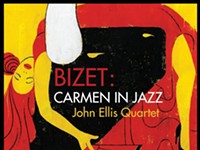
Album Review | 'Bizet: Carmen in Jazz'
Mar 26, 2024 -
'To Swing Is the Thing" by Mike Melito
Aug 10, 2023 - More »
